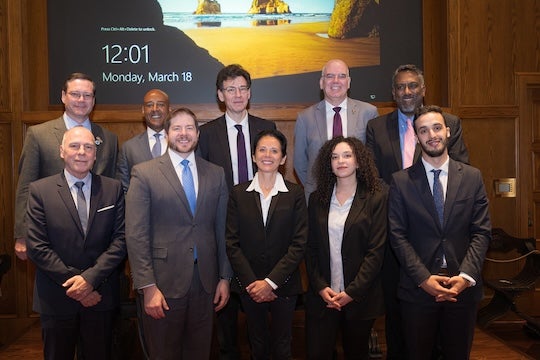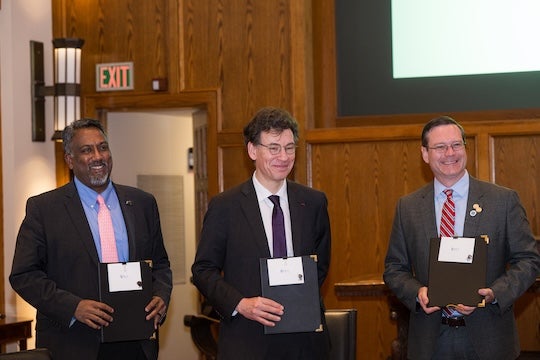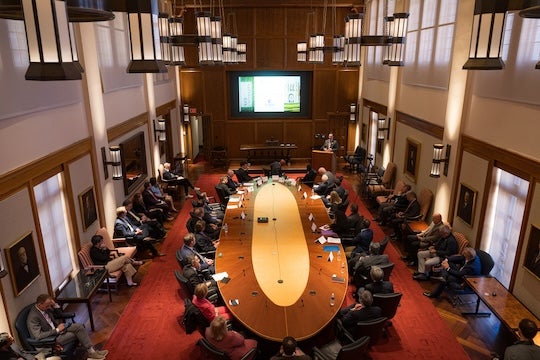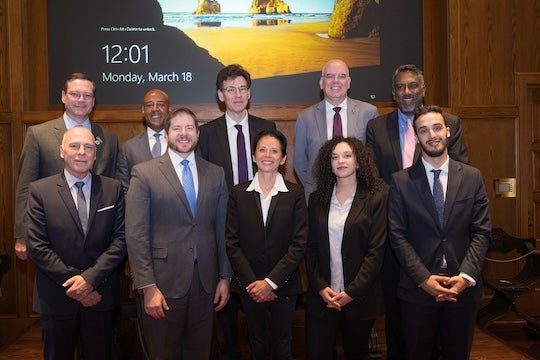In a significant stride toward advancing space exploration and fostering global partnerships, Rice University welcomed Philippe Baptiste, president and CEO of France’s National Center for Space Studies (CNES), for a visit March 18.
Baptiste’s trip to Rice underscored the importance of international cooperation in interplanetary exploration, emphasizing future collaborations between CNES, Rice and Houston Spaceport, a joint-use facility supporting NASA that is operated by the Houston Airport System.

The three parties represented by Baptiste, Rice President Reginald DesRoches and Director of Aviation at Houston Airport System Jim Szczesniak signed a letter of intent to deepen partnerships between the French and Houston space ecosystems.
“We are signing with Rice and Houston Spaceport to show our willingness to cooperate in education, trade, business and industry development,” Baptiste said. “I see this as an important first step in strengthening a long-lasting relationship.”
DesRoches highlighted the role of collaborative efforts in unlocking the mysteries of the universe and paving the way for future discoveries.
“Space exploration has always captivated the imagination of humanity, pushing the boundaries of what we perceive as possible and inspiring generations to reach for the stars,” DesRoches said.
Szczesniak shared his excitement about the new global alliance and the transformative impact it could have.
“We are excited to add this international component to the Houston Spaceport because, as we see it, growth is exponential going forward,” said Szczesniak. “The Houston Spaceport provides the location, labor and livability needed to support and sustain the international collaborative efforts needed to propel commercial spaceflight onward.”
For Rice, the announcement marks a significant step in expanding its global footprint in space exploration. Paul Cherukuri, vice president of innovation and chief innovation officer at Rice, stressed the university’s commitment to curiosity and ingenuity, qualities that have defined both the university and the city of Houston.

“We are putting our full force behind it,” Cherukuri said. “We are grateful for the opportunity to pursue this effort with the French space agency.”
Rice has a rich history in space exploration, dating back to 1959 when it initiated research collaborations with NASA shortly after the agency’s establishment. Over the years, Rice has maintained its leadership role in advancing space science and technology.
In recent years, the university has been fostering relationships with France’s space industry. Last April, the Rice Space Instituteparticipated in French Space Days, a Houston-based event aimed at facilitating interactions between French space entities and stakeholders in the Houston space ecosystem.
Additionally, leaders from the Houston and French space industries convened at the Rice Global Paris Center last November to deliberate on the future of spaceflight. The Rice Global Paris Center in Le Marais expands the university’s education and research opportunities, including the university’s space institute.
Looking ahead, Rice is set to host the 36th annual Space Studies Program (SSP) run by the France-based International Space University. The event will bring together hundreds of space industry and research professionals, further solidifying Rice’s position as a key player in the global space community.


